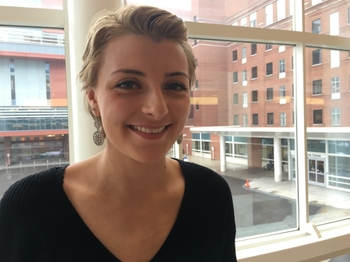After lymphoma diagnosis, survivor says: 'I learned up-close and personal how precious life is'

Since childhood, Jenna Cottrell has been a sports fan. In her early teens, she played soccer and started watching sports, activities that provided an escape for her. Back then, she had no idea this passion would turn into a career and an escape after a cancer diagnosis in her 20s.
In fall 2016, at age 25, Jenna started having headaches, fevers and fatigue, but they didn’t slow her down much. She continued life as normal — working as a sports reporter and anchor for WHAM-TV in Rochester and even meeting her boyfriend at a Halloween party.
By January, the symptoms had worsened. She had a lack of appetite, terrible night sweating and extremely uncomfortable fevers. She lost almost 15 pounds and often felt an intense fatigue she described as “tired in my bones.”
She also had some back pain, but she attributed that to carrying around a heavy camera for her job. On Jan. 13, while covering a Buffalo Bills press conference, she was sweating so profusely and looking so ill that another reporter felt the need to ask if she was OK.
She wasn’t.
She had been to the doctor already about the problem, but after that experience, she returned. A few weeks later, she learned she had stage 4 nodular sclerosing Hodgkin lymphoma.
“You know from that moment on, your life will never be the same,” she says. “It seemed almost insurmountable. I think a huge part of being diagnosed with cancer is just the mental portion of it. Physically, it’s like all right we’ve got to get through this, but mentally, sometimes it’s even more challenging.”
The week before she started treatment at Wilmot Cancer Institute, her fevers soared, reaching 105 degrees at one point. Luckily, chemotherapy brought the fever down quickly. She received chemotherapy every other week from mid-February to July.
During this time, she lost her hair, which was devastating, but her boyfriend and family were there to comfort her. Her mom even moved in with her for a little while to help.
“The role of a caregiver really can’t be understated, how important they are, in every sense,” she says.
She took about a month off from work and then started up slowly when she went back. Just the routine of waking up every morning, getting dressed, and driving in helped her feel better. She took it a little easy at work, staying near her desk instead of covering stories all around the region.
She’s grateful for her team at WHAM-TV for their support her throughout treatment, from verbal encouragement to bringing her food to helping her purchase a wig.
In addition to her co-workers’ generosity, she believes the nature of her work really helped her through treatment.
“I really think sports being a part of my job is what got me through this and being able to focus on something else other than myself and what I was going through,” she says. “I love sports because it’s usually someone’s best day.”
She added the people she gets to meet really inspire her.
“Seeing somebody who has struggled or has gone through loss and then goes and plays a game and excels because they’re channeling their feelings, little things like that just make it really cool to cover,” she says.
Jenna also credits her team, including Paul Barr, M.D., and Maureen Tremaine, R.N., M.S.N., who were compassionate and eased her fears with a treatment plan from the beginning, making a difficult situation a little bit better.
“You don’t want to be here, but the fact that the people here are so kind makes it that much easier,” she says.
It’s been more than a year since her diagnosis, and she continues to be in remission. Having cancer has shifted her outlook. She practices yoga now and tries to live a healthier lifestyle. She also is more conscious of taking time for what matters most in life to her.
“Even though my life now is different, I’m going to make it a better different and focus on being healthy and treating people that I love with love back and just try to make the best of it. We shouldn’t have to learn it the way I did, but I think it makes it more realistic,” she says.
“I really learned up-close and personal how precious life is.”


